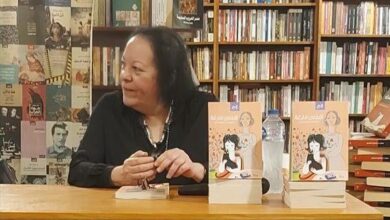The annual AUC Press Book, Art, and Music Festival held Wednesday at the Cairo Opera House celebrated the 25 January revolution by showcasing two recently published books of photos taken in Tahrir Square during protests. While the event’s mood was overwhelmingly positive, some are skeptical of AUC Press’ marketing of the revolution.
During the first hour-and-a-half, which was dedicated to mingling and book signing, all of the commotion was just to the right of the main stage of the venue. That is where photographer Mia Grondahl sat behind stacks of her book of photographs, “Tahrir Square”. At the next table sat Karima Khalil with the book she edited, “Messages from Tahrir”, a compilation of images from various photographers portraying the written messages displayed by anti-Mubarak protesters.
At one point, an attendee put a pot on his head, symbolizing the improvised armor used in Tahrir Square during some of the revolution’s nastiest battles, while those around him took his picture.
Although there were other books debuting, it was the images from revolutionary Tahrir Square that set the event’s tone and garnered the most attention from attendees.
Hedayet al-Mallaway, former English professor at Ain Shams University, attended AUC Press’s annual festival for the first time. Asked what brought her, she enthusiastically responded, “It’s great what they’ve done – the youngsters. I want Baradei to come and get these youngsters to be in ministries.”
Some however, elected not to attend the event.
Recent AUC graduate and former student activist Sarah Hawas is alarmed at what she calls, “the aggressive, predatory urge to capitalize on a political movement that they [AUC and AUC Press] had nothing to do with.”
Asked to clarify, she spoke about the decades-long relationship between AUC and the Mubarak regime. Former First Lady Suzanne Mubarak, accompanied by her son Gamal, inaugurated AUC’s new campus in 2009, Hawas recalls.
She noted the use of AUC’s Tahrir Square campus by government snipers on 28 January (which did not elicit a public statement from university officials until 7 March); the closure of university clinics in the face of a medical “crisis”; and AUC President Lisa Anderson’s 6 February mid-revolution email to professors saying that classes would commence the following week, and any absence would effectively equate to resignation.
Although Hawas is among the many who criticized AUC’s response to the revolution, attendees at Wednesday’s book event focused on the works and authors rather than the politics of the publishing house.
Ayman Mohyeldin, one of TIME magazine’s influential 100 for his work reporting on the revolution for Al Jazeera English, interviewed Grondahl onstage. Mohyeldin authored the foreword of her book “Tahrir Square”.
“Her pictures really capture the spirit of the revolution,” he said.
Grondahl offered her somewhat poetic take on the revolution: “A revolution is like falling in love. You just go ahead. Everything is wonderful. There are no worries. You can climb any mountain.”
Karima Khalil narrated the stories behind the images in “Messages from Tahrir” that were being projected for the audience to see. Some of the Tahrir signs brought laughter from the audience, others brought a chorus of wows, and still others brought somber head shaking.
Khalil showed an image of four brothers who had taped their mouths shut. They had vowed not to speak until Mubarak’s resignation in honor of their two brothers who were killed during the revolution.
“I love that one,” someone in the audience said.
To Hawas and other critics, AUC’s support for revolution-inspired works seems fake and a bit hypocritical.
“During the uprising, the university made absolutely no comment whatsoever,” she said.
Following Mubarak’s resignation though, AUC produced a “barrage of disingenuous, celebratory events,” according to Hawas. From creating classes related to the revolution to holding “massively funded” conferences on democracy, Hawas saw the creation of what she calls an “immoral economy.”
And now AUC’s publishing arm AUC Press is also celebrating the triumph of the 25 January Revolution.




